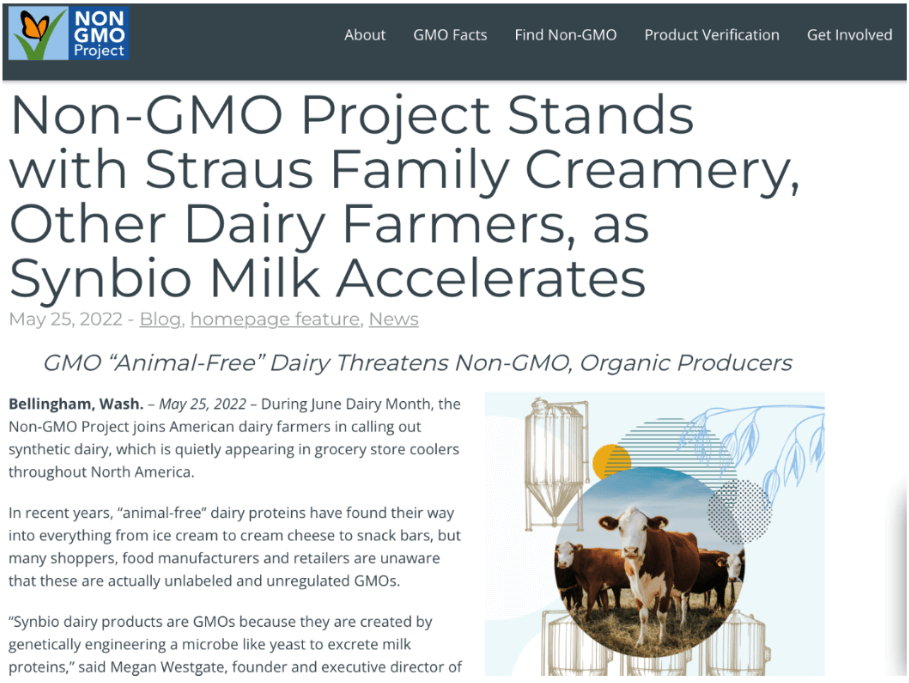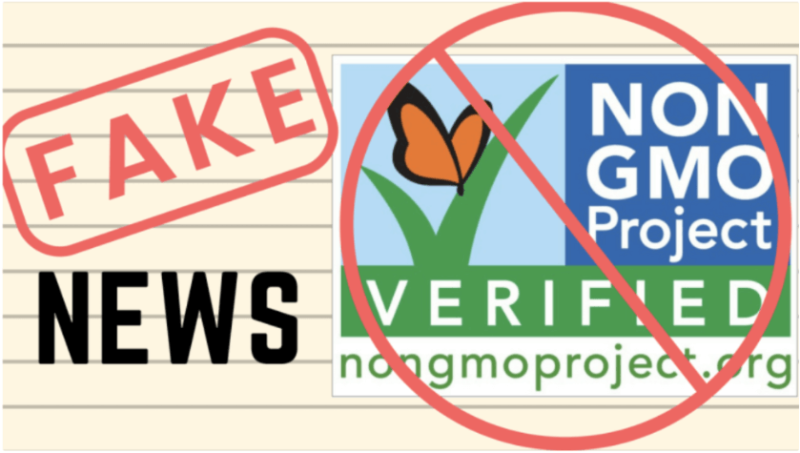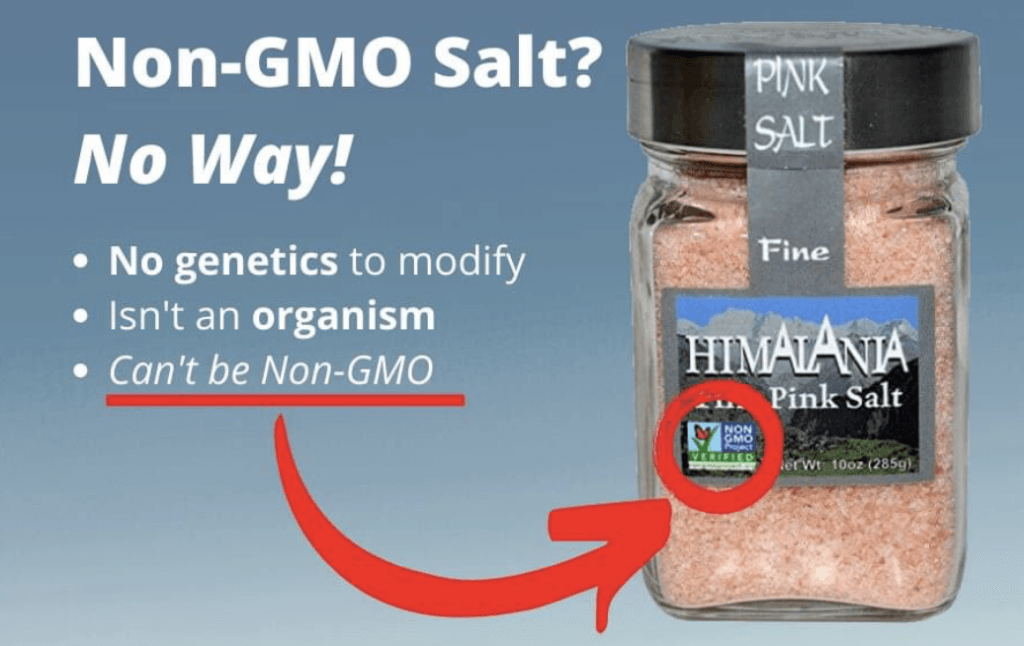The Non-GMO Project is a pay-for-certification scheme masquerading as a 501(c)3 organization. It allows food manufacturers to decorate their packages with the organization’s artwork—a label that implies a product free of risk, where none ever existed. The “certification” is simply an assertion that food in the package contains no ingredients derived from (perfectly safe) genetically engineered crops. It sells the label certification to companies as a marketing tool — there is no GMO ingredient in many of the products that have the label, including such things as table salt. In other words, its label is a gimmick, a way for companies to increase sales based on misinformation, and the Non-GMO Project is the enabler.
[Read GLP profile with extensive background on the organization’s marketing distortions]
It is notoriously known to make highly-dubious claims under the guise of education. The stated goal of this organic industry funded group is to ‘shrink’ the market for conventional foods by killing support for biotechnology innovation in agriculture. If it means distorting the facts, the Non-GMO Project is all in. Founded in 2008, it has disguised its intentions to the general public which sees it merely as a certification organization that allows companies to burnish a certificate that a product has no genetically modified ingredients. It charges companies from several hundred to several thousand dollars, depending on the complexity of a product’s supply chain.
the Non-GMO Project’s oft-admitted goal since its incubation has been to remove “unsafe and untested” GMOs from the marketplace, with the non-GMO label seen as a tool to make that happen. For instance, on its webpage, it asks: “Are GMOs safe?” Its answer:

It adds an inflammatory note:

That philosophy can be traced back to 1997, when Peter M. Ligotti, a Maharishi cult member and organic industry marketer pitched the potential marketing benefits of such a label to Whole Foods (email from WikiLeaks):
To label the non-GE food will create an incredible market niche in the U.S. and will create greater awareness of the issue world-wide. Marketing people would seize upon the idea as a way to create product differentiation while doing some good for the world…. Go for a total ban at the same time. When we do achieve a ban, we will need to know which products to leave on the shelves and which to throw away. Labeling the GE and NON-GE food will give us clarity when that day finally arrives.
In fact, upwards of 275 independent agencies across the world have determined that food grown from genetically modified seeds are no more or less potentially harmful than conventional crops. Moreover, the sustainability advantages of GM crops, especially in limiting carbon emissions and challenging climate change, are well documented. In one of dozens of recent studies, a February 2020 report focusing on Europe and published in Cell found:

So, what does this mean for the Non-GMO Project, which has built its empire on disinforming vulnerable consumers? As new technologies emerge to serve the food insecure and promote environmental dividends, the Non-GMO Project has had to make key decisions—do they stick to their mantra of rejecting modern biotechnology, or do they accept technologies that can benefit people and planet? It is a classical conundrum of profits vs. ethics, and as usual, profit wins.
Synbio changes the equation
This never-biotech stance is now challenged with the advent of synthetic biology (or synbio). Synbio-produced food ingredients are forcing everyone from consumers to manufacturers to rethink expectations.
Synthetic biology is a process that re-engineers the metabolism of microbes to synthesize ingredients desirable for food production. Scientists in labs can create new foods from proteins, carbohydrates, fats, vitamins, trace elements, cells and even air.
In a way, using microbes to alter or make new food is not new. Mankind has used yeasts, molds and bacteria to make food products such as bread, beer, wine, vinegar and yoghurt, as well as fermented fish, meat and vegetables. The enzyme used to curdle milk into cheese is purified from fermenters, growing a fungal species that produces an efficient version of chymosin originating from camels.
Synthetic biology is really no more than a way to streamline the process and produce certain products that are more specialized. For example, we can leverage the efficient productivity of microbes to manufacture molecules previously requiring expensive, laborious purification from plant or animal hosts, or chemical synthesis from molecular building blocks. For instance, natural vanilla flavor can be produced from recycled plastic bottles using synbio approaches.
In short, synbio can generate low-cost, precision fermented food ingredients, decrease carbon footprint, and eliminate the need for plants or animals in their production. Prior to the aforementioned microbially-based cheese enzyme, the milk-curdling chymosin was purified from the stomachs of calves.
But despite the breakthrough applications of synbio, the products are staunchly decried by the Non-GMO Project. In a recent press release it stated its rejection of “animal free” dairy, products chemically identical to their bovine-derived cownterparts.

Unlabeled and unregulated?
Worse, the Non-GMO Project uses its shoddy science fear factory to manufacture a sense of danger and risk. Their website refers to these dairy-free products as “unlabeled and unregulated GMOs” and mentions “accidental release of new GMOs into the environment.” This, when the products are bio-identical chemicals, not organisms, let alone genetically tweaked ones. The products are whey proteins like beta-lactoglobulin, molecules identical to those found in cow-derived milk.
Perfect Day, the leading company in this space, sees many levels of benefits in animal-free milk. They claim its chemical identity to traditional moo-juice, but create it via engineered microbes, in a process that generates a fraction of the greenhouse gases. The milk facsimile even seems to udderly satisfy vegans and others that reject traditional dairy products.
This puts the Non-GMO Project in a tricky space. Now they find themselves not only pitted against technologies to improve food security for the poor, but now they are forced to ideologically oppose products created to mitigate perceived issues in animal welfare, carbon generation, and the environmental impacts of animal agriculture.
Sometimes presumed consumer advocacy organizations make mistakes. They engage in activities diametric to the values of their followers, as long as they satisfy ideologically entrenched priorities and maintain the bottom line.
Here the Non-GMO Project continues to ignore three decades of safety data and reject forward-thinking applications of biotechnology. Instead, they dig in the heels, double down, and use their influence to non-scientifically tarnish the emerging products as somehow dangerous or bizarrely unnatural. To them, it is more important to oppose biotechnology than it is to embrace new tech that can potentially help address grand challenges in food production and food security.
It is indeed strange. In a world of real problems that are being resolved with new technologies, this multi-million dollar organization focuses on fake problems, with the intent to erode trust in new solutions.
Kevin M. Folta is a professor, keynote speaker and podcast host. Follow Professor Folta on Twitter @kevinfolta
































